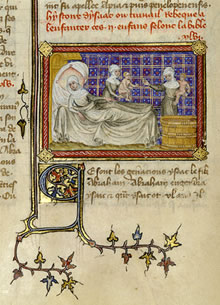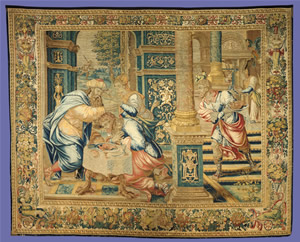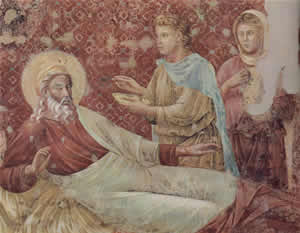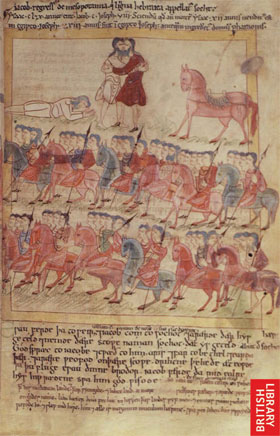Divine Redemption in Our Human Families:
Lessons from Jacob and Esau
For Sunday July 10, 2011
Lectionary Readings (Revised Common Lectionary, Year A)
Genesis 25:19–34 or Isaiah 55:10–13
Psalm 119:105–112 or Psalm 65:1–13
Romans 8:1–11
Matthew 13:1–9, 18–23
My maternal grandmother was an identical twin, and my two nieces are fraternal twins, so I gravitated this week toward the Genesis 25 story about the most famous twins in the Bible — Jacob and Esau. When I read the "holy" Bible, I don't normally expect stories about infertility, obstetrics, genealogy, legal wills, and family dysfunction. The story of Jacob and Esau feels like walking into a county court house and sifting through musty boxes of birth certificates, death notices, marriage licenses, records of lawsuits, medical histories of family pathology, and resentful letters never meant to be read by others.
But therein lies the story of our own redemption today. Divine grace meets us in our own flawed family histories.
 |
The birth of Esau and Jacob, Master of Jean de Mandeville, French, Paris, about 1360-1370. |
Sarah and her daughter-in-law Rebekah both suffered from infertility. According to the American Society of Reproductive Medicine, about 10% of the reproductive age population in the United States suffers infertility (affecting men and women equally). Multiple births are even more rare. Twins occur in roughly 3% of live births. Triplets, like our neighbors across the street from us, occur in about 1.8 per 1,000 live births. These statistical improbabilities in biology are components of our salvation narrative.
Whether ancient or modern, infertility is a tragedy for those who experience it. You don't expect good things to materialize out of infertility. Infertility feels like the absence of divine activity rather than its presence. Some people even construe it as divine punishment. But the story for this week reminds us that such conclusions can be premature.
Human loss and powerlessness are likewise components of redemption. And while multiple births bring special blessings, they pose unique challenges. Can you ever treat "identical" twins equally? Should you even try? How can such genetically similar people be so different? Statistically-speaking, both infertility and multiple births are uncommon, but that's how God acted in the lives of Isaac and Rebekah with the birth of the fraternal twins Jacob and Esau.
The Genesis story about Abraham's extended family encompasses roughly fifty people. Almost all of those who are mentioned are male, for females in that time and place didn't count, literally or figuratively. So, right there we've lost half of the story to the mists of history. If you drew a family radius that reached to your fifty closest relatives, who and what would that encompass? Our stories would include all that we read about here. It's not all pretty, and hardly the stuff of a Hallmark greeting card, but it's definitely the story of God's saving activity.
 |
Jacob receives Esau's blessing, anonymous Flemish tapestery, early 16th century. |
Abraham fathered at least eight sons by three women. We know of Ishmael and his mother, the Egyptian slave Hagar. Then there's Isaac who was born to Sarah. This week we read that after Sarah died, Abraham married Keturah, with whom he fathered six more sons. But Keturah's family stories screech to an abrupt halt.
For some unknown reason, the "book of records" (Genesis 5:1) names all six of Keturah's sons, but then identifies the offspring of just two of those six (Abraham's grand children). Then, it mentions how just one of those two grand sons gave birth to three clans (Abraham's great grand children). This spotty record feels random and incomplete, glaring with significant gaps. Surely there were some daughters born who remain lost to history? Nor does the record-keeper comment on any of its significance, if it had any significance. The stories of Keturah's sons with Abraham sputter out in a genealogical dead end.
We do learn one little dirty detail. Upon his death, "Abraham left everything he owned to Isaac" (Genesis 25:5). While he was living he patronized "the sons of his concubines" (not the concubines themselves, mind you) with a few trinkets, after which he "sent them away from his son Isaac." So much for maintaining warm family relations. Abraham actively disinherited seven of his eight sons and their families, and then banished them. It's hard to imagine a better recipe for family resentment.
 |
Isaac rejects Esau, Giotto di Bondone, 1290's. |
Similarly, we learn precious little about Ishmael, the one son born to Abraham by Hagar. Ishmael fathered twelve sons (and maybe some unmentioned daughters?), and the chronicler lists each one of their names. He adds that Ishmael died, and then makes the ominous observation that "they lived in hostility toward all their brothers." Given how Abraham disenfranchised most of his offspring when he disposed of his massive wealth, and how Sarah and Hagar bickered jealously from the beginning, I suppose sibling rivalry is what you'd expect, along with effectively erasing you from the written record of family history.
That brings us to the infertile couple Isaac and Rebekah, and the birth of their famous twins Jacob and Esau. During Rebekah's pregnancy the twins "jostled each other within her," like some harbinger of further family feuding. In a reversal of that culture's conventional wisdom, God announced that the older boy would serve the younger. From birth the fraternal twins were different. Esau was born rough and ready, a hairy boy who grew up to be a rugged hunter who loved the open country. Jacob "was a quiet man, staying among the tents." We find him cooking in the kitchen with the women (25:29).
Aggravating these differences, the parents played favorites. Isaac favored Esau, and Rebekah doted upon Jacob. Jacob eventually conned his brother Esau of the family birthright, which under normal Semitic conditions gave the bearer a double share of the family inheritance. Later, Rebekah lied to Isaac so that she and Jacob could swindle the family blessing. Jacob learned his lessons well, too, for a few chapters later he too played favorites, loving Rachel more than Leah.
Now baptize this family pathology with a dose of religion: "God blessed Isaac" (26:3, 12). Which is to say that God carried out his plans for human redemption through one of the twin boys but not the other. Jacob, not Esau, became the father of the nation Israel. Through four women — the sisters Rachel and Leah, and their slaves Bilhah and Zilpah — Jacob also fathered twelve sons who became the heads of the twelve tribes of Israel — from whom would come the Christ.
 |
Meeting of Jacob and Esau, 11th century Old English Bible by Aelfric. |
And brother Esau? Esau became the titular head of rival Edom (Genesis 36). Fratricide would characterize their later family history.
There's mystery and an odd sort of encouragement in this Semitic family history that's central to the story of salvation. We don't know why God chose Isaac instead of Ishmael, or one of Keturah's six boys, or Jacob instead of Esau. It's not clear why we learn so tantalizingly little about Keturah's six boys or Ishmael's twelve sons. No explanation is offered. The choice appears random and arbitrary. Maybe it was. In that all of these undeserving characters are so deeply flawed, so entirely human, God's choice was clearly not based upon merit.
None of the players in this story come off well. They give the lie to so-called Biblical "family values." None of them offered better mettle for the history of salvation. Far from it. And therein we can take encouragement. These people and their families look, feel, sound and act suspiciously like our own. Yet God worked mightily through the statistical improbabilities and practical challenges of infertility, multiple births and deviant behavior. In his gracious hands the incidental, the accidental and the ordinary become the material of redemptive history, both in ancient Israel and in our own families today.
For further reflection
* Why do you think some Christians suggest that our families should be perfect or free from problems?
* How has God worked in and through your own family's brokenness?
* For a remarkable story of divine redemption within deep family dysfunction, see Mary Karr's memoir Lit.
* Consider how the genealogy of Jesus affirms God's solidarity with fallen humanity. On page one of his gospel Matthew lists forty-two men in Jesus's genealogy, then four women with unsavory pasts. Tamar was widowed twice, then became a victim of incest when her father-in-law abused her as a prostitute (Genesis 38). Rahab was a foreigner and a whore who protected the Hebrew spies by lying. Ruth was a foreigner and a widow, while Bathsheba was the object of David's adulterous passion and murderous cover-up (Matthew 1:1–17). This is the family tree of Jesus our Lord.
Image credits: (1) J. Paul Getty Museum; (2) Fine Arts Museum, San Franciso; (3) Wikipedia.org; and (4) British Library Images Online.





